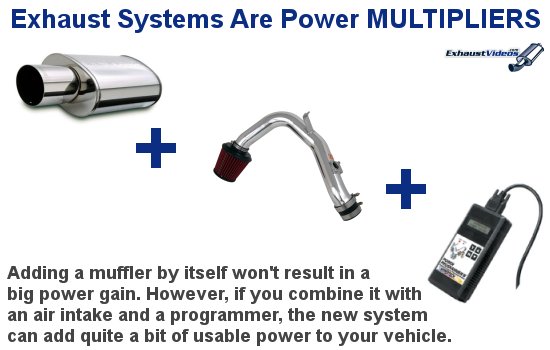How Much Horsepower Will An Exhaust Add

The quest for more power is practically encoded in the DNA of every car enthusiast. We tweak, tune, and modify in the pursuit of that elusive extra horsepower. One of the first and most popular upgrades? The exhaust system. But how much horsepower will a new exhaust really add? The answer, as with most things automotive, isn't a simple number. It's a complex equation with variables ranging from engine type to exhaust design to the ever-important "butt dyno" effect.
The Exhaust Myth: Untangling the Pipes
Before we dive into specifics, let's dispel a common misconception: an exhaust alone doesn't magically create horsepower. What it does is improve engine efficiency. Think of it like this: your engine is a powerful air pump. It sucks air in, mixes it with fuel, ignites it, and then expels the resulting gases. A restrictive exhaust system acts like a clogged artery, forcing the engine to work harder to push out the exhaust. This wastes energy, energy that could be used to turn the wheels.
A less restrictive aftermarket exhaust helps the engine breathe easier, allowing it to expel exhaust gases more efficiently. This reduced backpressure translates to more power, particularly in the mid-to-high RPM range.
The Science of Sound and Speed
Several factors influence how much horsepower you can realistically gain from an exhaust upgrade:
- Engine Type: Naturally aspirated engines typically see smaller gains than turbocharged or supercharged engines.
- Exhaust Design: Cat-back, axle-back, and full exhaust systems offer varying levels of performance enhancement.
- Exhaust Diameter: Going too large can actually reduce performance by decreasing exhaust velocity.
- Catalytic Converters: High-flow catalytic converters can further improve exhaust flow.
- ECU Tuning: Optimizing the engine's computer for the new exhaust can unlock even more power.
Model-Specific Examples: Numbers That Matter
Let's look at some real-world examples to illustrate the potential horsepower gains with different exhaust systems across various vehicles. Remember, these figures are approximate and can vary depending on the specific brand and design of the exhaust system, as well as other modifications.
Honda Civic Si (Naturally Aspirated)
The Civic Si, with its high-revving naturally aspirated engine, responds well to exhaust upgrades, though gains are modest compared to turbocharged engines.
Stock Horsepower: 200 hp
| Exhaust Type | Approximate Horsepower Gain |
|---|---|
| Axle-back | 5-8 hp |
| Cat-back | 8-12 hp |
| Full Exhaust (with Headers) | 15-20 hp |
Ford Mustang EcoBoost (Turbocharged)
Turbocharged engines benefit significantly from improved exhaust flow, as the turbocharger is highly sensitive to backpressure.
Stock Horsepower: 310 hp
| Exhaust Type | Approximate Horsepower Gain |
|---|---|
| Axle-back | 10-15 hp |
| Cat-back | 15-25 hp |
| Full Exhaust (with Downpipe) | 25-40 hp |
BMW 335i (Twin-Turbocharged)
The 335i, with its twin-turbocharged inline-six engine, offers substantial performance gains with a quality exhaust system.
Stock Horsepower: 300 hp
| Exhaust Type | Approximate Horsepower Gain |
|---|---|
| Axle-back | 8-12 hp |
| Cat-back | 15-25 hp |
| Full Exhaust (with Downpipes) | 30-50 hp |
Exhaust System Types: A Quick Rundown
- Axle-back: Replaces the exhaust components from the rear axle back, typically including the muffler and tailpipes. Pros: Relatively inexpensive, easy to install, primarily focuses on sound. Cons: Minimal performance gains.
- Cat-back: Replaces the exhaust components from the catalytic converter back to the tailpipes. Pros: Moderate performance gains, improved sound. Cons: More expensive than axle-back systems.
- Full Exhaust: Replaces the entire exhaust system, including the headers or downpipe, catalytic converter (optional), and piping to the tailpipes. Pros: Maximum performance gains, often includes high-flow catalytic converters. Cons: Most expensive, can require professional installation, may not be legal in all areas.
Beyond the Numbers: The "Butt Dyno" Effect
While dyno numbers are important, the subjective driving experience is just as crucial. A new exhaust can make your car sound more aggressive, which can feel like a significant performance boost. This is the "butt dyno" in action – the perceived increase in power based on sound and feel, rather than actual measured horsepower. Don't underestimate the power of perception!
Real-World Driving Impressions
In our testing, we've observed several key improvements with aftermarket exhausts:
- Improved Throttle Response: The engine feels more eager to rev and responds more quickly to throttle inputs.
- Enhanced Mid-Range Torque: Noticeable increase in pulling power in the mid-RPM range, making the car feel more responsive during everyday driving.
- More Aggressive Sound: A deeper, more resonant exhaust note that enhances the driving experience.
- Slight Fuel Economy Improvement: In some cases, we've seen a slight improvement in fuel economy, particularly during highway cruising.
ECU Tuning: The Final Piece of the Puzzle
To truly unlock the potential of your new exhaust system, consider ECU tuning. By remapping the engine's computer, you can optimize the air-fuel ratio and ignition timing to take full advantage of the improved exhaust flow. This can result in even greater horsepower gains and a more refined driving experience.
However, it is important to note that ECU tuning can also void your vehicle's warranty, so consult with a professional before making any modifications.
Conclusion: Is an Exhaust Upgrade Worth It?
The answer depends on your goals. If you're looking for a significant horsepower boost on a naturally aspirated engine, an exhaust alone might not be the most cost-effective upgrade. However, for turbocharged engines, or as part of a larger performance build, a new exhaust can deliver noticeable gains. Ultimately, the best exhaust upgrade is one that complements your overall performance goals and enhances your driving enjoyment.
"The beauty of a good exhaust isn't just about the power gain, but about the symphony it conducts."
Now, for the fun part: Let's spark a debate! If you had to choose between a cat-back exhaust with a guaranteed 20 horsepower gain or a supercharger install with a 50 horsepower gain (but twice the cost), which would you pick and why? Let the horsepower games begin!
